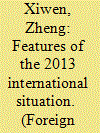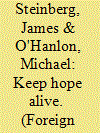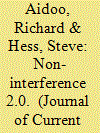| Srl | Item |
| 1 |
ID:
128320


|
|
|
|
|
| Publication |
2013.
|
| Summary/Abstract |
The international situation in 2013 is on the whole stable. There is profound transformation in the world economy, deep adjustment in major-country relationships and accelerated evolvement of regional hotspots, leading to new major changes in the international political, economic and security landscapes.
|
|
|
|
|
|
|
|
|
|
|
|
|
|
|
|
| 2 |
ID:
132152


|
|
|
|
|
| Publication |
2014.
|
| Summary/Abstract |
At their summit in California last June, U.S. President Barack Obama and Chinese President Xi Jinping committed themselves to building trust between their countries. Since then, new official forums for communication have been launched (such as the military-to-military dialogues recently announced by the two countries' defense ministers), complementing existing forums such as the Strategic and Economic Dialogue (which features the countries' top diplomats and economic officials). But despite these efforts, trust in both capitals -- and in the countries at large -- remains scarce, and the possibility of an accidental or even intentional conflict between the United States and China seems to be growing. Given the vast potential costs such a conflict would carry for both sides, figuring out how to keep it at bay is among the most important international challenges of the coming years and decades. The factors undermining trust are easy to state. East Asia's security and economic landscape is undergoing massive, tectonic change, driven primarily by China's remarkable economic rise in recent decades. That economic miracle, in turn, has made it possible for China to increase its military capacity and ramp up its political role in the region and beyond. China's leaders and prominent strategists have been at pains to insist that China's rise will be peaceful and poses no threat to its neighbors or the existing international political and economic order. But many members of the world community remain concerned and even skeptical, noting that history and international relations theory are replete with examples of conflict arising from clashes between a dominant and a rising power."
|
|
|
|
|
|
|
|
|
|
|
|
|
|
|
|
| 3 |
ID:
137198


|
|
|
|
|
| Summary/Abstract |
China’s non-interference policy has come under scrutiny in regards to its growing and deepening relations in Africa. The policy has come to represent an about-face from conditional assistance and investment associated with the Washington Consensus. Although often well received in much of the global South, this policy has drawn a lot of criticism from the West and others. These commentators have perceived non-interference as an opportunistic and often inconsistent instrument for enabling China’s increasing access to African resources and markets. This article suggests that despite some consistent support for the rhetoric of non-interference, China’s implementation of the policy has become increasingly varied and context-ualized in reaction to Africa’s ever-more diversified political and economic landscape since the early 2000s.
|
|
|
|
|
|
|
|
|
|
|
|
|
|
|
|